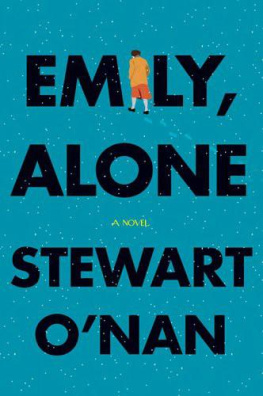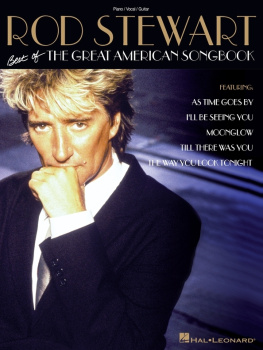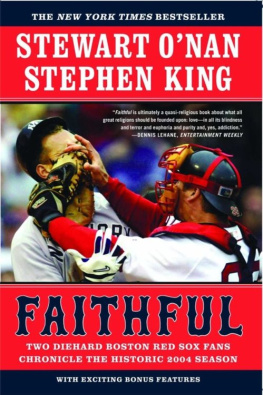ALSO BY STEWART ONAN
FICTION
Songs for the Missing
Last Night at the Lobster
The Good Wife
The Night Country
Wish You Were Here
Everyday People
A Prayer for the Dying
A World Away
The Speed Queen
The Names of the Dead
Snow Angels
In the Walled City
NONFICTION
Faithful (with Stephen King)
The Circus Fire
The Vietnam Reader (editor)
On Writers and Writing, by John Gardner (editor)
SCREENPLAY
Poe
ALSO BY STEWART ONAN
FICTION
Songs for the Missing
Last Night at the Lobster
The Good Wife
The Night Country
Wish You Were Here
Everyday People
A Prayer for the Dying
A World Away
The Speed Queen
The Names of the Dead
Snow Angels
In the Walled City
NONFICTION
Faithful (with Stephen King)
The Circus Fire
The Vietnam Reader (editor)
On Writers and Writing, by John Gardner (editor)
SCREENPLAY
Poe
TWO-FOR-ONE
Tuesdays, Emily Maxwell put what precious little remained of her life in Gods and her sister-in-law Arlenes shaky hands and they drove together to Edgewood for Eat n Parks two-for-one breakfast buffet. The Sunday Post-Gazette, among its myriad other pleasures, had coupons. The rest of the week she might have nothing but melba toast and tea for breakfast, maybe peel herself a clementine for some vitamin C, but the deal was too good to pass up, and served as a built-in excuse to get out of the house. Dr. Sayid was always saying she needed to eat more.
It wasnt fara few miles through East Liberty and Point Breeze and Regent Square on broad streets they knew like old friendsbut the trip was a test of Emilys nerves. Arlenes eyes werent the best, and her attention to the outside world was directly affected by whatever conversation they were engaged in. When she concentrated on a thought, she drove more slowly, making them the object of honking, and once, recently, from a middle-aged woman who looked surprisingly like Emilys daughter Margaret, the finger.
Obviously I must have done something, Arlene had said.
Obviously, Emily agreed, though she could have cited a whole list. It did no good to criticize Arlene after the fact, no matter how constructively. The best you could do was hold on and not gasp at the close calls.
In the beginning theyd taken turns, but, honestly, as atrocious as Arlene was, Emily trusted herself even less. Henry had always done the driving in the family. It was a point of pride with him. When he was dying, he insisted on driving to the hospital for his chemo himself. It was only on the way home, with Henry sick and silent beside her, bent over a plastic bowl in his lap, that Emily piloted his massive Olds down the corkscrewing ramps of the medical centers parking garage, terrified shed scrape the sides against the scarred concrete walls. For several years she used the old boat to do her solitary errands, never venturing outside of the triangle described by the bank, the library and the Giant Eagle, but after a run-in with a fire hydrant, followed quickly by another with a Duquesne Light truck, she admittedbitterly, since it went against her innate thriftinessthat maybe taking taxis was the better part of valor. Now the Olds sat out back in the garage with her rusty golf clubs as if decommissioned, the windshield dusty, the tires soft. She wasnt a fan of the bus, and Arlene had made a standing offer of her Taurus, itself a boxy if less grand antique. The joke among their circle was that shed become Emilys chauffeur, though, as that circle shrank, fewer and fewer people knew their history, to the point where, having the same last name, they were sometimes introduced by the well-meaning young, at a University Club function or after one of Donald Wilkinss wonderful organ recitals at Calvary, as sisters, a notion Arlene though not Emily found wildly amusing.
Today, as always, Arlene was late. It was gray and raining, typical November weather for Pittsburgh, and Emily stood at the living rooms bay window, leaning over the low radiator and holding the sheer curtain aside. The storm window was spotted and dirty. A few weekends ago, her nextdoor neighbor Jim Cole had generously hung them, but hed failed to clean them properly, and now there was nothing to be done until the spring. She would spend a morning tending to them herself, the way her mother had taught her, with vinegar and water, wiping them streak-free with newsprint, but that was months off.
Outside, the trees and hedges along Grafton Street were bare and black, and the low sky made it feel like late afternoon instead of morning. The Millers was still for sale. Their leaves hadnt been picked up yet, and lay smothering the yard, a dark, sodden mass. She wondered who would be looking to buy this time of year. The last shed heard, Kay Miller was in an assisted living place over in Aspinwall, but that had been in August. Emily thought she should visit her, though in truth it was the last thing she wanted to do.
When she thought of fashionable, flighty Kay Miller in a place like the one in Aspinwall, she couldnt help but picture Louise Pickerings final hospital room. The oatmeal bareness, the mechanical bed, the plastic water pitcher with its bent straw on the rollaway table. Consciously, she knew those places could be very nice, just as homey as your own bedroom, or close to it, but the vision of Louise persisted, and the idea that she was at an age where all was stillness and waitingnot true, yet impossible to dismiss.
She was dying, yes, fine, they all were, by degrees. If Dr. Sayid expected her to be devastated by the idea, that only showed how young he was. There was no point in going into hysterics. It wasnt the end of the world, just the end of her, and lately shed come to think that was natural, and possibly something to be desired, if it could be achieved with a modicum of dignity, not pointlessly drawn out, like Louise undergoing all those torturous lastditch procedures because Timothy and Daniel refused to give up. Shed never wanted to be eighty. Practically, shed never wanted to outlive Henry.
A stale, metallic heat rose from the radiator, baking her shins. With her car coat buttoned up to her neck and her scarf already tucked in, it was oppressive. She let go of the curtain and turned away.
On the front hall runner, Rufus sat at attention, staring at the door as if he might open it by sheer mind power.
I told you, Emily said, youre not going anywhere. Go lie down. Go.
Reluctantly he padded to his spot at the bottom of the stairs and circled twice before collapsing with a huff on the rag rug, his snout pointed toward her.
Yeah, she said, Ive got my eye on you too, mister. I dont want to find anything when I get home. You know what Im talking about.
He looked up at her guiltily, as if he understood, and part of her argued that it wasnt his fault. Technically he was older than she was, ancient for a springer, and lately hed taken to sleeping most of the day away, like Duchess before she died. He could also be badand hed never been beforegetting into the garbage or gnawing on a chair leg or peeing on the carpet right in front of her, as if hed gone senile. What am I going to do with you? she asked, as she would a child, because there was no answer. She could only scold him and clean up the mess, and when she left him home alone like now, she worried.
She heard Arlenes car pull in before he did. Out front, through the gauzy curtains, a dark blob filled the driveway.








